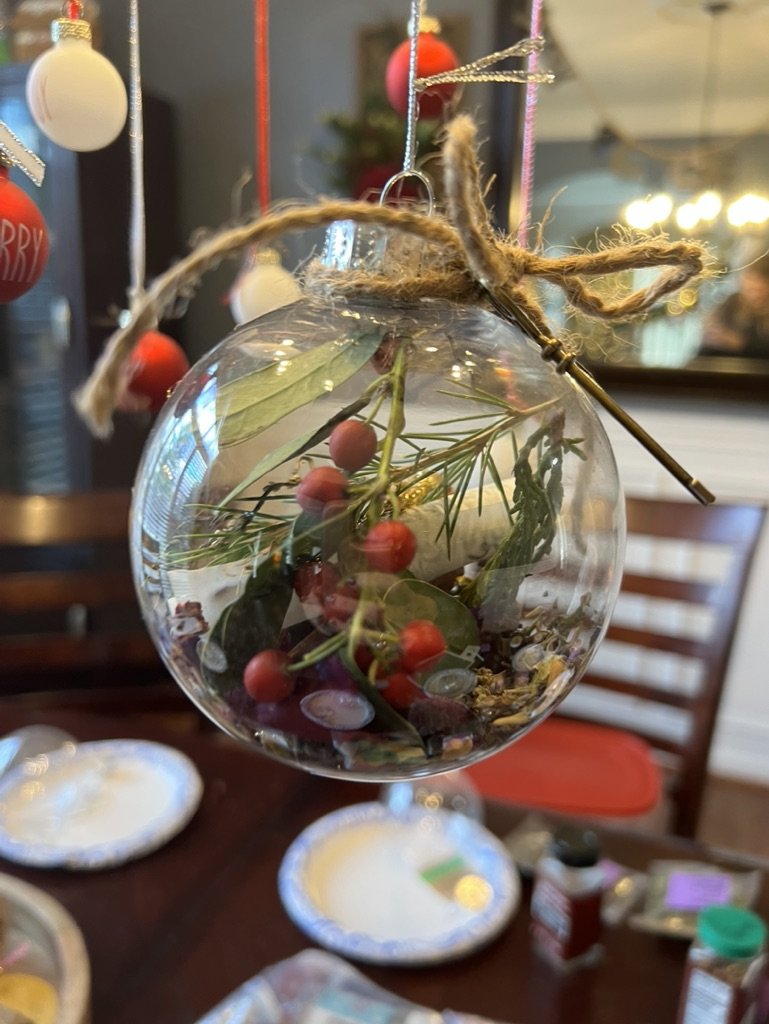Witch Balls & Blessing Balls: Bringing Protection, Intention, and Beauty into Your Space
Witch balls and blessing balls have enchanted us for centuries, bringing protection, positive energy, and intention into our homes. These magical ornaments have roots in folklore and witchcraft, originally created to ward off negativity and protect loved ones. Today, they’re beloved not only for their beauty but also for the personal intentions we weave into them. In this guide, we’ll explore the history of witch balls, how to create a DIY witch ball, and ways to use them as powerful charms for your home. Download our free Witch Balls Packet & Workbook to guide you in crafting a blessing ball filled with your unique intentions!
What are Witch Balls and Blessing Balls?
Witch balls, also known as blessing balls, originated in European folklore as protective charms. Traditionally made from blown glass, they were hung in windows or near doorways to capture negative energy, ward off malevolent spirits, and prevent the “evil eye” from affecting the household. These DIY witch balls were believed to absorb harmful energy, providing a layer of spiritual protection for homes and their inhabitants.
Today, people make witch balls for various intentions, such as attracting love, peace, prosperity, or whatever energy they wish to invite into their lives. A blessing ball isn’t just an ornament—it’s a piece of positive energy you can personalize and use to manifest intentions in your space.
The History and Purpose of Witch Balls and Blessing Balls
Witch balls have a fascinating history rooted in old-world witchcraft and European folk traditions. In earlier times, witch balls were crafted from hand-blown glass and filled with items meant to trap or deflect negative energy, particularly when hung in a window where they could capture sunlight.
Their purpose was twofold: to protect and to bless. People believed these magical ornaments could shield the home from harm and bring positive energy into everyday life. Modern blessing balls retain this dual purpose. When you create your own, you’re honoring a long history while adding a personal touch, inviting intention and spiritual protection into your own space.
Choosing Your Intention
Before you begin making a witch ball, decide what you want it to represent. Setting a clear intention is key to creating a powerful charm. Popular intentions for blessing balls include:
Protection: Guarding the home and those who dwell within it
Abundance: Inviting prosperity and new opportunities
Peace: Cultivating a calming, harmonious space
Love: Nurturing self-love or deepening relationships
When setting your intention, consider taking a few moments to meditate or journal. By focusing on the specific energy you want to bring into your space, you infuse your witch ball with purpose from the start.
Gathering Your Materials
When it comes to materials, there’s no limit to what you can use. However, each item in your witch ball will add its own energy and symbolism. To make your witch ball for protection, peace, love, or any other intention, choose materials that resonate or vibrate with that frequency. Here are some common choices:
Herbs and Flowers:
Lavender for peace, rosemary for protection, rose petals for love
Crystals:
Amethyst for calm, citrine for abundance, clear quartz for clarity
Colors:
Red ribbon for passion, green for growth, blue for tranquility
Personal Tokens:
Small charms, feathers, or any meaningful item that represents your intention
As you gather each item, focus on the energy it represents. There’s no right or wrong here—what matters is that each item aligns with your personal vision for the blessing ball.
For a detailed list of herbs and their meanings as well as step by step instructions download my FREE Witch Ball Guide.
Hanging Your Witch Ball
Once your ball is complete, it’s time to place it somewhere meaningful. Where you display it can further reinforce its purpose. For example:
Protection: Near the front door or in a window facing outside
Love and Harmony: In a shared space like a bedroom or family room
Peace and Calm: Where you meditate or practice self-care, or the bedroom
Abundance and Success: Near your workspace or home office
These intentional placements help align your space with your witch ball’s unique energy.
Download Your Free Witch Balls Packet & Workbook!
Ready to dive deeper? Download our exclusive Witch Balls Packet & Workbook to guide you through creating your own DIY witch ball for protection, peace, and positivity. Inside, you’ll find:A Beginners Guide to Blessing Balls and Witch Balls
Learn how to select your intention and the matching materials to infuse your ball
A printable list of herbs, crystals, and color descriptions with spiritual meanings to enhance specific energies
Practical tips for cleansing, charging, and displaying your blessing ball
Download my free Witch Balls Packet & Workbook to get a printable guide on creating your own DIY witch ball for protection, peace, and positive energy! Start creating your magical, intentional piece of art that enhances your life and home today.
FAQ
1. What is the purpose of a witch ball?
Witch balls are protective charms traditionally used to ward off negative energy, prevent harm, and bring positive intentions into a space. They can be personalized to attract love, peace, protection, or any other energy you wish to invite into your life.
2. How do witch balls work for protection?
Witch balls work as protective tools by symbolically “trapping” negative energy or by acting as a focus point for your intention. Placed near doors or windows, they are believed to absorb harmful energies and keep your space safe.
3. Where should I hang my blessing ball?
The best place to hang your blessing ball depends on its purpose. For protection, hang it near the front door or in a window. For peace, place it in a calm room like a bedroom. For abundance, your workspace or home office is ideal.
4. Can I use different materials in my witch ball?
Yes! You can use any materials that align with your intention, such as herbs, crystals, ribbons, charms, or other meaningful items. Each item should represent the energy you want to bring into your life.
5. What is the difference between a witch ball and a blessing ball?
While both are used to hold intentions, witch balls are traditionally focused on protection and warding off negativity. Blessing balls are often used to attract positive energies like love, peace, or abundance. They’re essentially the same tool but used with different focuses.
6. How can I use a witch ball to attract love?
To create a witch ball for love, choose items that symbolize affection, harmony, and connection. You might include rose petals, a small rose quartz crystal, and a pink or red ribbon, all of which represent love and emotional bonding. Placing your love-attracting blessing ball in your bedroom or a space where you spend time with loved ones can enhance its energy.
7. How can I make a blessing ball for abundance?
For a blessing ball to attract abundance, fill it with symbols of prosperity and growth. Citrine or green aventurine crystals are popular choices, as they are known for manifesting wealth and opportunity. Herbs like basil and bay leaves also symbolize abundance. Place your abundance blessing ball in your workspace, office, or another area related to career and finances to align with its energy.
Making a witch ball or blessing ball is a powerful way to bring intention, creativity, and a bit of magic into your life. Each one is a unique reflection of its creator, filled with purpose and energy. I hope you feel inspired to create your own and share it with those around you! If you do, I’d love to see what you create. Share a photo on social media and tag me to join a community of creators bringing positive energy and beauty into the world, one blessing ball at a time.






